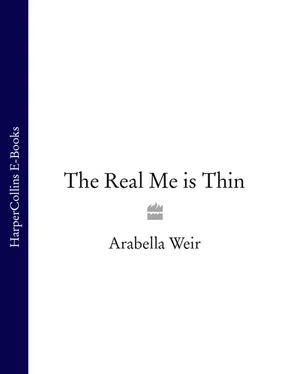After we’d returned to Britain in 1963, with my little sister, Christina, born the year before, we set up home in a large flat in central London while Dad looked for a suitable house to buy. Dad was back in the Foreign Office and I can barely remember him being around at all, and Mum clearly wasn’t happy. One day, outside ‘eating hours’, I complained to Mum, ‘I’m hungry.’ She replied brusquely, ‘Fine. It’s good for you.’ I didn’t know what she meant. I had no idea what she was talking about. At that young age I knew nothing about dieting and the process of denying yourself food in order to lose weight. Mum didn’t go on to explain the procedure or my apparent need to know about such things. However, I did immediately realise that my telling her I was hungry had made her cross. And I remember quickly thinking I’d have to get something to eat without her finding out.
There must have been other ’ticking off incidents related to my hunger and or food before this, but it’s the one that sticks in my mind as the moment when the dreaded box was first opened: the box marked ‘how to have a neurotic relationship with food’ or, depending on who’s responsible for producing the box in the first place, you might call it the ‘how to give your child an unhealthy attitude to food’ box. Or put simply, and without apportioning any blame, it was a key lesson in ‘how to get fat’.
Thwarted and confused, I was – naturally – still hungry, and could not begin to work out how the gnawing in my stomach was in any way ‘good for me’. Satisfied that I was going to accept her reaction to my announcement, Mum went off while I hung around in the hall. I allowed a few minutes to pass and then strolled casually, with as best a nothing-to-see-here-rm-not-thinking-about-food-anymore-at-all air as I could fashion, past the open door to the living room, where my mother was now immersed in a book, and snuck into the kitchen.
Once there, I did something I’d never done before and it surprised me. After a last-minute perimeter check I went over to the cupboard, sneaked out a packet of biscuits, and wolfed down the entire thing. As each successive one made its dry, crumbly way down my throat I quickly realised that I didn’t actually want the whole packet at all. I knew I only really wanted one or two, but I was panicking by now. It had been made clear that I wasn’t going to get any through the approved channels, so I thought I’d better secure as many as I could covertly, and by any means necessary. I was anxious that, when official ‘biscuit time’ came round, my hunger, left unsated, would be so massive that there simply wouldn’t be enough biscuits in the world, never mind in our flat, to hold it at bay. In any case, the prevailing ‘biscuit law’ in our house meant that no one was ever really allowed more than two for fear of unleashing an avalanche of eyebrow raising and sharp inhalation of breath, accompanied by a tirade of unfavourable comments about what wanting more than two said about your entire personality, and that’s leaving aside the very real possibility of being called a ‘greedy pig’ in front of everyone else.
But to me this hunger wasn’t my friend, it wasn’t being nice to me, so how could it possibly be ‘good for me’? When has hunger ever helped anyone do anything? I was completely bemused. It wasn’t like brushing my teeth, which I was always being nagged to do. It was tedious but did at least feel good after I’d done it and I believed it stopped my teeth from falling out. An unfed hunger is a monster on your back. And when you’re a hungry child, unable to cater for yourself and someone, apparently deliberately, won’t feed you, you just feel upset, enraged, and powerless. From then on the whole ‘hunger is good for you, eating is bad for you’ became established as a recurring theme in my life and I very quickly lost all sense of proportion regarding food. I lost the ability to distinguish between nice food and food I didn’t fancy. I lost the ability to eat moderately. I lost the capacity to know what ‘full’ meant. I just had to eat what I could when I could. I began to crave food, in any form, all the time.
On that particular biscuit day something had to be done to kill my hunger, and if Mum thought it was so ‘good for me’ to be hungry, then obviously she wasn’t about to help me tackle it to the ground. I couldn’t waste time thinking about how many biscuits I actually wanted. Now that I had in my grasp the means of reducing my hunger I just had to stuff in as many as possible before I was discovered. Only that way would I get rid of the hunger, ensure it didn’t return soon, and, most importantly, avoid being at the mercy of Mum’s erratic feeding regime again that day.
In adult life I’ve learnt that this kind of bingeing is known as ‘ensuring your supply’, where you (or more specifically me) do something irrational like, say, cramming down a whole loaf of bread in one go because you fear you won’t be allowed any, even a perfectly reasonable slice or two, when the time for eating bread comes along. I’m told that, when a social event is looming, alcoholics who are acknowledged as such by family and friends drink in advance and in secret, downing much more than they need to reach the inebriated state they crave, because they know they can’t have one or two drinks in public like everyone else, since that will inevitably lead to questions about their drinking.
My mum and dad, by this time at loggerheads on practically everything, were at least united in the shared worry that their first-born daughter was getting fat and agreed I needed to be reigned in. Once my parents started focusing on my size it was made clear that I wouldn’t be allowed to eat the same things my siblings were eating, since they weren’t deemed overweight. The scene was now set for what turned out to be a lifetime of feeling under attack by the enemy – hunger, which raged seemingly constantly on one side, with parental disapproval looming on the other. As a result I have never felt entitled to eat nor, moreover, to enjoy eating. Good girls don’t eat.
It’s probably fair to say that I have never, ever put anything in my mouth without thinking about whether it’ll make me fat – well, fatter – and I do mean not one single thing.
In my experience most family members have affectionate nicknames for each other (or supposedly affectionate, at any rate). If not actual nicknames then a shorthand way of referring to their relatives. These monikers are often taken from a dominant characteristic that particular family member is seen to demonstrate. When we hear people say ‘My sister’s the bossy one’ or ‘My brother’s the grumpy one’, we don’t think that’s the only trait their sibling has. We know what they’re talking about. We understand that it’s their ‘thing’ and that that person is more neat or bossy than the rest of his/her family. We are ‘placed’ by our family members and our position is carved out from early on. It doesn’t have to mean very much at all about how your family gets along. It’s just something families do, bigger ones especially. The same is true of school friends and work colleagues; any group of people spending a lot of time together replicate a family of some sort.
Your position in your own family may be perfectly benign and extend to no more than being ‘the forgetful one’ or ‘the tidy one’. However, if the label your family gives you is reductive, and informs how they treat you, then it’s less benign and harder to break away from. In my family, for blindingly obvious reasons (not least because it was said out loud), I was the fat one. Even when I’d grown up and sometimes wasn’t actually fat (or, rather, was less fat than at other times), eating with either of my parents remained fraught with anxiety. Any discussion of anything edible, never mind the act of actually eating, in the presence of any member of my family still hurls me into a gripping panic that I won’t get enough.
Читать дальше












